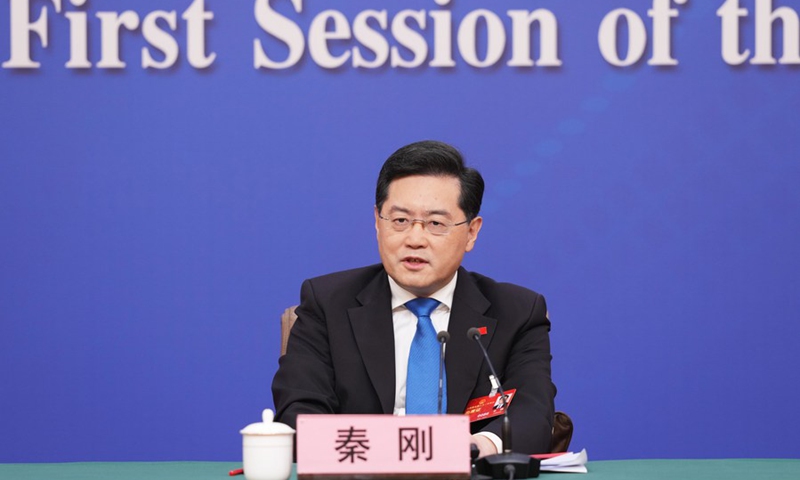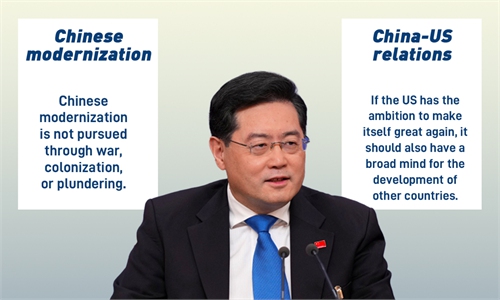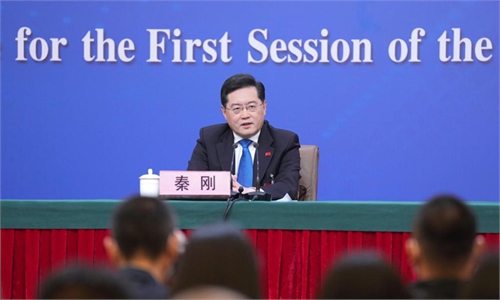China's diplomacy ‘confronts wolves head-on,’ gaining glorious accomplishments amid hardships: Global Times editorial

Chinese Foreign Minister Qin Gang attends a press conference on China's foreign policy and foreign relations on the sidelines of the first session of the 14th National People's Congress (NPC) in Beijing, capital of China, March 7, 2023. Photo: Xinhua
On Tuesday, Chinese Foreign Minister Qin Gang answered questions from journalists both home and abroad about China's foreign policy and external relations. The foreign minister's press conference is one of the highlights of the two sessions every year. In particular, this year's press conference is the first after three years that the Chinese foreign minister met with the press in-person and the first since Qin took the post. It has naturally received attention from all sides.In 114 minutes, Qin answered a total of 14 questions, using lively and humorous language to vividly explain the goals and missions of China's diplomacy, as well as clearly express the country's propositions and position on major-country relations, neighborhood diplomacy and hot issues. His words reflected the continuity and certainty of China's diplomacy, as well as Qin's personal style. Sincerity, frankness, broad-mindedness and self-confidence are people's prominent impressions of this press conference.
The press covered a very comprehensive range of topics, while not avoiding sharp topics of concern to the world. For example, in terms of foreign exchanges, Qin expressed his firm will to develop friendship and cooperation with other countries, noting that China will generate new opportunities for the world with its new development. When talking about the Belt and Road Initiative, he said "its cooperation is conducted through consultation, and its partnerships are built with friendship and good faith." In fact, from the press conference, the world intuitively feels that China will firmly safeguard its core interests and always be a builder of world peace, a contributor to global development, and a defender of the international order. This is also the overall style of Chinese diplomacy in the new era.
International public opinion has particularly paid attention to Qin's statement on China-US relations, which from one aspect highlights the significance of this bilateral relationship and also shows the outside world's realistic concerns about China-US relations. Qin bluntly pointed out that the US' perception and views of China are seriously distorted, which is like "the first button in a shirt being put wrong." If the US does not hit the brake but continues to speed down the wrong path, there will "surely be conflict and confrontation." He also mentioned that the China-US relationship should be determined by the common interests and shared responsibilities of the two countries and by the friendship between the Chinese and American peoples, rather than by US domestic politics or the hysterical neo-McCarthyism. This is not only a warning to Washington but also shows the Chinese side's responsible and serious attitude toward China-US relations.
We have noticed that some Western media are scrutinizing this press conference with a magnifying glass, attempting to label Chinese diplomacy as "moderate" or "hard-line," but this is clearly a misdirection. In fact, Qin has made it very clear at the press conference that the so-called "wolf warrior diplomacy" is a narrative trap. In China's diplomacy, there is no shortage of goodwill and kindness, but if faced with jackals or wolves, Chinese diplomats would have no choice but to confront them head-on and protect our motherland, said Qin. In other words, wherever China's national interests lie and wherever the morality of maintaining peace and stability lies, Chinese diplomats will stand there.
"It is worth emphasizing that the narrative trap mentioned by Qin is precisely the despicable means that Washington has repeatedly used in recent years to seek geopolitical private interests. Taking advantage of its public opinion hegemony, Washington has constantly set narrative traps such as the "Chinese debt trap," "rules of international order," and "democracy vs. authoritarianism," and by continuously smearing China, it attempts to trip up China while covering up its own unpopular actions of starting a new cold war under the name of "competition." It's clear that the US policy toward China has completely deviated from the rational and healthy track, and the US cannot expect China not to respond in words or actions. This is absolutely impossible."
At the same time, Qin also stated that the American people, just like the Chinese people, are friendly, kind and sincere, and want a better life and a better world. While confronting wolves head-on, China's diplomacy has never given up the pursuit of unity, cooperation, and peaceful development. This is reflected prominently in China's growing circle of friends. China is having more and more new friends and increasingly closer old friends. In the eyes of the vast majority of normal countries in the international community, China is a friendly, enthusiastic, and willing-to-share good neighbor and partner. Some Western media and public opinion claim that China's diplomacy is becoming increasingly "tough," and some even feel targeted during the press conference, which just shows who the "wolves" are in today's international relations - they know it very well.
What a China that always focuses on development, with great certainty and a strong sense of responsibility, will bring to the world is a sense of stability and steadfastness, and this will first be conveyed through diplomacy. As Qin said, the new journey of China's diplomacy will be an expedition with glories and dreams, and it will also be a long voyage through stormy seas. The harder the mission, the more glorious its accomplishment. We look forward to China's diplomacy in the new era to have more outstanding performances under the guidance of Xi Jinping Thought on Diplomacy.


